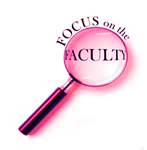Together they have two boys, ages 4 and 6; their pictures and drawings are hanging in his office.
Following in his father's footsteps, Korey received his B.S. from the University of Notre Dame in 1996. In 2001 he earned his Ph.D. from Harvard University. Korey was also a Post-Doctoral Fellow at Massachusetts General Hospital from 2001 to 2003.
Barbara Bannan, a 2007 C of C alumnus, works as a technician in Korey's lab. "He's very laid back and approachable," she says. "We like to pick on him because he's so modest about his accomplishments."
Korey's research focuses on the use of the fruit fly as a model system for understanding human neurological disease. The brain of a fruit fly compared to the brain of a human is very different, but the ways in which the cells act and function are similar, he says. This allows scientists to study them and better understand how drugs and diseases affect the human brain.
Why fruit flies? "Because they don't have bones," Korey explains. "People have problems with testing on organisms that have bones." Considerations have to be taken with disposal of dead organisms, as well as living space and food consumption, he says.
Currently Korey and his team are focusing on Batten Disease, a neurodegenerative pediatric brain disease similar to Alzheimers and Huntingtons diseases. In particular, they research the infantile form of Battens.
"I don't know if you ever make a big discovery, at least at the time," Korey said. "Students begin to see that research is slow and methodical." However, the study of different organisms all together will help in the long run, he says.
Along with Beth Meyer-Bernstein, Korey organized the Symposium for Young Neoroscientists and Professors of the SouthEast (SYNAPSE). This was a one day regional undergraduate neuroscience conference held in March at the College of Charleston. Once a year Korey selects a few senior students, packs up his entire lab and heads to the Society for Neuroscience annual meeting.
"I give them the opportunity to explore what it's like to be a scientist on all levels," Korey says.
###
|

